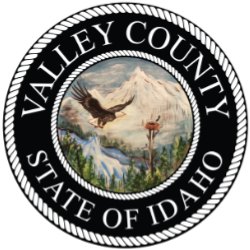Treasurer FAQ

Property tax statements will be mailed by the 4th Monday in November each year.
Reminder notices are mailed mid-May.
NOTE: Failure to receive a property tax statement does not waive penalty or interest.
Property taxes are due December 20th. If the first half is paid on time, the second half can be paid without penalty or interest by June 20th.
Pay online 24 hours-a-day, seven days a week.
Pay in person at the Valley County Courthouse: 219 N Main St., Cascade, Monday - Friday 8:00am - 5:00pm.
Pay by mail.
- All payments must be postmarked by the 20th.
- The postmark is the U.S. Postal Service cancellation stamp.
- A metered postage stamp with a date is not a postmark.
- Remit payment to:
Valley County Tax Collector
PO Box 1350
Cascade, ID 83611
Pay by phone during our normal business hours, Monday - Thursday 8:00am - 5:00pm.
The amount of property tax is based on the budget needs of the taxing districts (local governmental units like the county, city, school district, fire district, etc.) where the property is located. Officials for each taxing district decide the annual budget needed to provide services. The part of the approved budget to be funded by property taxes is divided by the total applicable taxable value of all properties within the district. This same calculation is made for each taxing district where your property is located and the resulting tax rate for each district is added together. The total property tax rate is multiplied by 100% of the market value of your property less statutory exemptions to calculate the taxes you owe.
Please visit our Story Map for a detailed explanation: Understanding Property Taxes (arcgis.com)
The law does not limit the increase in the property taxes on an individual property but does limit the amount taxing districts (local governmental units) can increase the generally nonvoter approved revenue to be received from property taxes. Each taxing district can increase the generally nonvoter approved property tax revenue it will receive by 3 percent plus a growth factor for new construction and annexation. If the rate of increase in property tax revenue is less than the rate of increase in total taxable value of all property within the taxing district, the property tax rate will decrease. However, property taxes may increase on individual properties if the rate of change in value of that specific property exceeds the rate of change in value of all properties. Additionally, voter-approved issues like bonds and overrides may exceed the limitation.
A taxing district is an entity which is authorized by law to levy taxes to provide services to a group of property owners in a particular area. Idaho code 63-3101 defines a taxing district as any county, any political subdivision of the state, any municipal corporation, including specially chartered school districts, any quasi-municipal corporation, or any other public corporation authorized by law to levy taxes. The most well-known taxing districts are school districts, cities, highway districts, cemetery districts and fire protection districts. There are other, less known, districts which may include the county fair, historical society, noxious weed control, and the library.

